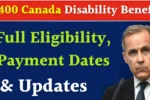US Driving License Rule Changes: From September 2025, the US Department of Transportation is launching major new driver’s license rules affecting Americans aged 70 and above. These nationwide updates aim to ensure road safety for all while maintaining the independence and dignity of senior citizens.
Why Are New Rules Introduced?
America’s population is aging rapidly. By 2025, there will be more than 48 million licensed drivers over the age of 65. For seniors, driving is not just about mobility—it’s about independence, attending medical appointments, shopping, and meeting friends. However, age can bring slower reaction times, eyesight problems, and changes in cognitive functioning, which has prompted new, balanced regulations.
Key Rule Changes for Senior Drivers
From September 2025, all states must implement a tiered renewal process based on age and ability. Unlike previous one-size-fits-all approaches, the rules now require specific testing and renewal schedules for older drivers.
Main Features of the New Federal Rules
- Tiered renewal periods for ages 70–79, 80–86, and 87+.
- Mandatory vision screenings and reaction time assessments.
- Cognitive and annual in-person road tests for drivers aged 87+.
- Possible restrictions on driving hours, areas, or road types for those with reduced abilities.
Age-Based Renewal Requirements
The table below details how license renewal will work for seniors starting September 2025:
| Age Group | Renewal Frequency | Required Tests/Checks |
|---|---|---|
| 70–79 | Every 4 years | In-person or telehealth vision test |
| 80–86 | Every 2 years | Vision + reaction time/cognitive test |
| 87+ | Annually | Full in-person road test + eye test |
State-by-State Differences
| State | Online Renewal | Road Test Policy | Eye Test Requirement |
|---|---|---|---|
| California | No | Required after age 70 | Age 70 |
| Florida | Yes | Mandatory from age 80 | Age 80 |
| Illinois | No | Required from age 87 | Age 79 |
| Texas | No | DMV discretion | All ages as needed |
Though this is a federal initiative, states have some flexibility in implementation. For example, telehealth vision assessments may be allowed in specific states.
Types of Assessments and Tests
Vision Test
All senior license renewals now require formal vision screening. This identifies issues like cataracts, glaucoma, or decreased night vision. Glasses or corrective lenses should be worn during these tests if prescribed.
Cognitive Screening
If the DMV receives reports of confusion or the driver has a condition such as dementia or suffered a stroke, a basic cognitive screening may be required. These check memory, reaction times, and decision-making ability.
Behind-the-Wheel Test
Annual on-road driving tests are mandatory for those aged 87 years or older. These are designed to identify potential mobility or safety problems before they lead to accidents.
Reporting Unsafe Senior Drivers
The new law introduces a fair system where doctors, family members, or concerned community members can confidentially report a driver they believe may be unsafe. The DMV then calls the driver for reassessment. This process is designed to prevent accidents and protect both the senior and the community.
Restricted Licenses—A Middle Ground
Not all seniors will lose their licenses if they fail part of the assessment. Possible restrictions may be applied, such as:
- Driving during daylight only
- Prohibited highway driving
- Staying within a certain distance from home
This helps seniors perform everyday tasks while minimizing risk.
Alternatives to Driving
If senior drivers can no longer safely drive, several alternatives make transitions smoother:
- Discounted taxi, Uber, or Lyft rides for seniors
- Free or reduced-fare public transportation passes
- Community senior shuttle vans
- Rural ride voucher programs
Preparing for the New Rules
Seniors and their families should take these steps ahead of renewals:
- Get eyes checked at least 90 days before renewal
- Collect medical records from relevant specialists (neurologists, cardiologists, etc.)
- Stay updated with local DMV rules—each state may offer unique procedures
- Consider defensive driving or refresher courses; in some states, completion can waive certain tests
Impact and Goals of the Law
The purpose of these changes is not to punish seniors for aging. Rather, the intent is to:
- Fairly assess and verify a senior’s driving ability
- Reduce the risk of road accidents
- Maintain as much independence for seniors as safely possible
When well-prepared and informed, seniors can face these new rules with confidence.
Frequently Asked Questions (FAQs)
1. When does the new driving law for seniors begin?
The new law begins nationwide in July–September 2025 and applies to all drivers aged 70 and older.
2. Will all seniors need to take annual road tests?
No. Road tests are mandatory each year only for drivers aged 87 and above.
3. Can family members or doctors report a senior driver they believe is unsafe?
Yes. The DMV accepts confidential reports and may call the driver for reassessment if legitimate safety concerns exist.
4. Will seniors lose their licenses at a specific age?
No. Renewal frequency and required checks simply increase with age; only those failing assessments or tests may face restrictions or non-renewal.
5. What transportation options are available if a senior can no longer drive?
Several alternatives exist, including discounted taxi/rideshare, public transit passes, senior shuttle vans, and rural transportation programs.
Source: https://www.themirror.com/lifestyle/cars/driving-laws-rule-change-driving-1344251















